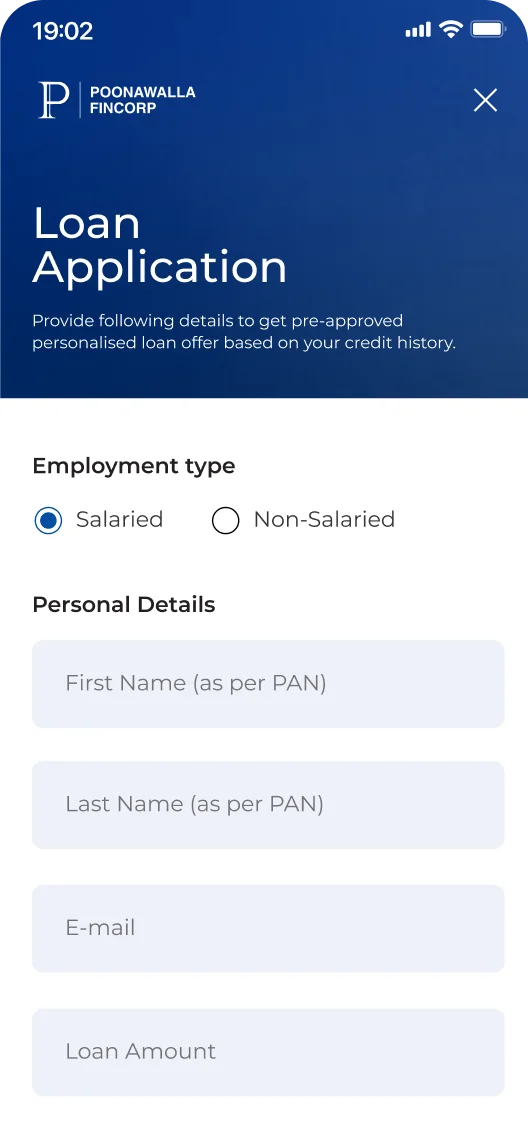Check Your CIBIL Score for a Loan Against Property
A crucial factor that influences your Loan Against Property application is your CIBIL score. This 3-digit number reflects your creditworthiness depending on your repayment history, credit management behaviour, etc.
Generally, a preferred minimum CIBIL score for Loan Against Property is 750. Moreover, maintaining a higher score can unlock better interest rates and loan terms.
The minimum CIBIL score for Loan Against Property is at least 750 for quick and smooth approval. However, if you have a low CIBIL score, aim to increase your CIBIL score to at least 750 to secure the best loan terms, such as lower interest rates and higher loan amount.
A CIBIL score is a crucial factor influencing your eligibility for a Loan Against Property (LAP). Check out the table below to learn about different CIBIL score ranges:
| CIBIL Score Ranges | Creditworthiness |
| 550 and below | Bad |
| 550 - 649 | Poor |
| 650 - 699 | Average |
| 700 - 749 | Good |
| 750 - 900 | Excellent |
Having a good CIBIL score is important but maintaining the same can be difficult. Here are 5 factors that you must avoid to have a good CIBIL score:
- Repayment history
- Credit utilisation ratio
- Credit mix
- Defaults and written-off accounts
- Hard credit inquiries
Follow these essential tips to improve your CIBIL score, increasing your chances of approval for a Loan Against Property:
- Pay your EMIs on time
- Maintain a balanced mix of secured and unsecured loans
- Avoid multiple credit inquiries
- Keep your credit utilisation ratio below 30%
- Avoid settling debts
Happy Customers, Happy Us


Throughout my loan journey, the Poonawalla Fincorp team showcased exceptional dedication, in-depth product knowledge, and a truly customer-centric approach. At every stage, they guided me with patience and clarity, making the entire process seamless, transparent, and timely. Their proactive communication and unwavering willingness to go the extra mile are a testament to the organization’s high standards of service excellence. Such professionalism not only fosters strong customer trust but also reinforces Poonawalla Fincorp’s reputation as a leading, customer-focused financial institution. I extend my heartfelt thanks to the entire team for their commendable efforts and wish them continued success in all their endeavors.


I am incredibly grateful for the outstanding support I received throughout my loan process. The guidance provided made every step feel manageable and stress-free. What stood out most was the humility and genuine willingness to help at every stage, qualities that made a significant difference in my experience. Without this support, the journey would have been far more challenging. I truly appreciate the dedication and helpful nature that was consistently demonstrated. The efforts put forth were invaluable, and I feel fortunate to have worked with someone so committed and supportive.


It was really great working with Poonawalla Fincorp. Thanks to the support and coordination by the team. I was able to get a significant portion of my requirements despite having a bit of a mess in my financial records. The loan processing and disbursement process at Poonawalla Fincorp was super smooth. They were incredibly cooperative and helpful. I’m looking forward to building a healthy relationship with them in the future. Thank you.


Poonawalla Fincorp’s Pre-owned Car Loan made the entire financing process effortless. The loan approval was quick, and the minimal documentation made it even more convenient. Within just a couple of days, the funds were disbursed, allowing me to purchase a well-maintained pre-owned vehicle without any hassle. The repayment options were flexible, and the entire experience was seamless. Thanks to Poonawalla Fincorp, I could get my car without any financial strain. Highly recommended!


Securing a loan to purchase a commercial property with rental income was crucial for my business. Having previously worked with Poonawalla Fincorp, I was confident in their services. The process was incredibly smooth and transparent. The quick disbursement and excellent post-sales support made the entire experience stress-free. Thanks to Poonawalla Fincorp, I now own a prime commercial property in Mumbai, which has significantly boosted my business. Their quick turnaround time and excellent post-sales support made all the difference. I wholeheartedly recommend them to anyone in need.


I had a great experience with Poonawalla Fincorp’s Pre-owned Car Loan. The offered loan amount was as per my expectations, and the entire process was smooth and hassle-free. The documentation was minimal, and the loan was disbursed in just two days! What stood out was the flexibility—repayment was easy, and the EMI structure was well-planned. The loan approval process was straightforward, making it convenient to get the car I wanted without any delays. Overall, the service was excellent, and I highly recommend Poonawalla Fincorp to anyone looking for an easy and quick loan process!


A friend in need, is a friend indeed. Poonawalla fincorp has been like one of those friends for me, who has supported me in my journey. With no hidden charges and no prepayment charges, the company has provided me with the adequate funds I needed for me professional practice. From the loan application process to the disbursal of funds, I did not face any problems. My experience was hassle-free and smooth. Not just me, all my fellow professionals and friends have had a wonderful experience with Poonawalla Fincorp’s Professional Loan.


I am practicing Chartered Accountant (CA) based out of Hubli. There were working capital issues that i was facing like upgrading my firm’s overall infrastructure, hiring well-qualified staff and digitization. Poonawalla fincorp hab been of great support when it comes to funding these requirements. I’ve got one of the best interest rates available in the market, my documentation process was fast & hassle-free. and the digital application process made it very simple to get a Professional Loan as a CA. I recommend to CAs to consider Poonawalla Fincorp for their working capital or any other funding requirements.


I run a chain of farmacy stores with 5 branches in pune. With the growing polpularity of home delivery, my customers were expecting the same from me as well. However, the extra capital requirement made it difficulf for me to hire delivery persons. With Poonawalla fincorp’s Business loan, I am now able to compete with online pharmacy retailers, manage working capital and upgrade my system. My customers have grown 50-60%. The loan applicatipn process is digital, simple and speedy. I was delighted to get my loan amount disbursed quickly, allowing me to upgrade my operationg seamlessly.
Get Exclusive Access to Simplified
Personal Finance Information at
Poonawalla Fincorp’s FinHub
Frequently Asked Questions
The minimum CIBIL score required for a Loan Against Property is 750.
You can improve your CIBIL score by making timely payments on existing debts, maintaining low credit card balances, and avoiding applying for new credit.
Yes, a CIBIL check is standard practice to assess your creditworthiness for a Loan Against Property.
You can check your CIBIL score for free from Poonawalla Fincorp’s official website and on the Poonawalla Fincorp app.




